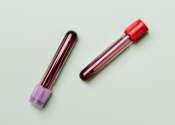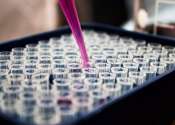Last update:
Medical research news
Medical research
Y chromosome found to play key role in making men taller than women
Height is one of the most evident sex-based differences observed in humans, as men are on an average 13 cm (5 inches) taller than women. Sex hormones certainly play a significant role in driving this dimorphism, but they ...
21 hours ago
0
15
Medical research
Advanced tools offer improved insights into brain injury patients' condition and their potential for recovery
Trauma centers nationwide will begin to test a new approach for assessing traumatic brain injury (TBI) that is expected to lead to more accurate diagnoses and more appropriate treatment and follow-up for patients.
May 20, 2025
0
0
Patient with advanced skin cancer in remission for more than a year following clinical trial of WTX-124
A common and unsightly skin cancer that can turn deadly has been undetectable for more than a year in a patient treated with a new targeted immune-therapy in a clinical trial at HonorHealth Research Institute.
May 20, 2025
0
2

How molecules can 'remember' and contribute to memory and learning
Researchers have discovered how an ion channel in the brain's neurons has a kind of "molecular memory," which contributes to the formation and preservation of lifelong memories. The researchers have identified a specific ...
May 19, 2025
0
19

Got pruney fingers? Here's the scientific skinny to explain it
As swimming season heats up, you might notice your fingers wrinkle after spending time in the water—turns out, those wrinkles are the same with every dip you take.
May 19, 2025
0
5

Sweat and saliva testing as an alternative to blood sampling
What if we could monitor patients in the future without taking blood samples every time? TU/e researcher Sophie Adelaars investigated a promising alternative: measuring biomarkers in sweat and saliva. In May 2025, she defended ...
May 16, 2025
0
0

A brief history of federal funding for basic science
Biomedical science in the United States is at a crossroads.
May 15, 2025
0
1

Traditional Chinese medicinal fungi might show potential for central nervous system diseases
Shandong researchers suggest that edible and medicinal fungi contain bioactive components with therapeutic potential for central nervous system (CNS) diseases. Findings offer evidence for the potential of these fungi to serve ...

The 'badscopal effect': High-dose radiation therapy may spur growth in untreated metastatic tumors
In a new study published in Nature, researchers at the University of Chicago Medicine Comprehensive Cancer Center explore a surprising phenomenon in which high doses of radiation cause growth in existing metastatic tumors ...
May 14, 2025
0
13

Embryonic macrophages found to control blood stem cell numbers in bone marrow
Scientists at the Leibniz Institute on Aging—Fritz Lipmann Institute (FLI) in Jena have discovered a previously unknown function of immune cells in the bone marrow.
May 14, 2025
0
23

Sex-based brain differences: Structure of a single neuron in C. elegans provides new insights
Is there a difference in brain structure between men and women? If we were to find such a difference in a single neuron, would it matter?
May 13, 2025
0
20

High-dose radiotherapy can be safe and promising for lung cancer in combination with immunotherapy
Higher-than-usual doses of radiation in the treatment of inoperable lung cancer can be safely combined with immunotherapy without increasing the risk of severe lung inflammation (pneumonitis). This is the key finding of a ...
May 13, 2025
0
0

Science requires ethical oversight—without federal dollars, society's health and safety are at risk
As the Trump administration continues to make significant cuts to NIH budgets and personnel and to freeze billions of dollars of funding to major research universities—citing ideological concerns—there's more being threatened ...
May 12, 2025
0
1

Man bitten by snakes 200 times may help create new antivenom
Tim Friede has survived hundreds of snakebites—on purpose. For nearly two decades, he let some of the world's most dangerous snakes sink their fangs into his arms, all for science.
May 10, 2025
0
12

Functional bioprinted spinal disks offer new hope for understanding and treating back pain
University of Manchester scientists have successfully pioneered a way to create functioning human spinal disks, aiming to revolutionize our understanding of back pain and disk degeneration in a leap for medical science.
May 9, 2025
0
39

Probiotic supplementation may help reduce chemotherapy side effects in breast cancer
Chemotherapy is one of the most popular ways to treat breast cancer. Even though it has proven to be effective, it also has downsides, such as a higher risk of side effects, as it doesn't only attack the cancer cells but ...
May 9, 2025
0
0

Vitamin supplements may slow down the progression of glaucoma
A vitamin supplement that improves metabolism in the eye appears to slow down damage to the optic nerve in glaucoma. The promising results have been published in the journal Cell Reports Medicine. The researchers behind the ...
May 8, 2025
0
91

Q&A: Silent scorpion-sting epidemic in Brazil driven by urbanization and climate change
Prof Eliane Candiani Arantes heads the Laboratory of Animal Toxins at the School of Pharmaceutical Sciences of Ribeirao Preto, University of São Paulo (USP) where her group is working with toxins found in the venom of the ...
May 8, 2025
0
0

Signals from dying cells may spur liver regeneration after acetaminophen injury
Acetaminophen is the most frequently taken fever and pain medication worldwide, but overdosing can be toxic to liver cells. In the United States, about 1,600 cases of acute liver failure and 500 deaths occur each year due ...
May 8, 2025
0
0

Iron-activated molecules show promise against aggressive, treatment-resistant cancer cells
Current anticancer treatments essentially target the primary tumor cells that proliferate quickly, but do not effectively eliminate specific cancer cells able to adapt to existing treatments and which exhibit high metastatic ...
May 7, 2025
1
68

Rare hunting dogs' unique noses may offer clue to cause of cleft lip and palate in humans
It's not entirely understood why some children are born with orofacial clefts, such as cleft lip or palate. But a new study suggests a genetic clue may be found in a rare breed of hunting dog.
May 7, 2025
0
34

Cold water plunges may not speed women's post-exercise recovery, clinical trial finds
In a randomized clinical trial with 30 female participants, neither cold- nor hot-water immersion improved recovery from exercise-induced muscle damage. Vanessa Wellauer and colleagues at the University of Applied Sciences ...
May 7, 2025
0
0

Tiny cellular 'antennae' could be fueling cancer, scientists warn
Microscopic command centers in our bodies called primary cilia—once thought irrelevant—could be hidden switches powering cancer growth and drug resistance, new research reveals.
May 6, 2025
0
33

Newly identified protein could mitigate or eliminate excessive scarring during wound healing
A study published April 12 in Nature Communications identifies a protein that helps prevent excessive scarring. The protein, called fibromodulin (FMOD) forms a complex of molecules with interleukin 1β that stops myofibroblasts ...
May 6, 2025
0
37

Phage therapy may treat drug resistance in patients with cystic fibrosis
Antimicrobial resistance, in which germs like bacteria and fungi no longer respond to medicines, is a rising global threat. When antibiotics and other drugs become ineffective, infections can become difficult or impossible ...
May 6, 2025
0
40













































